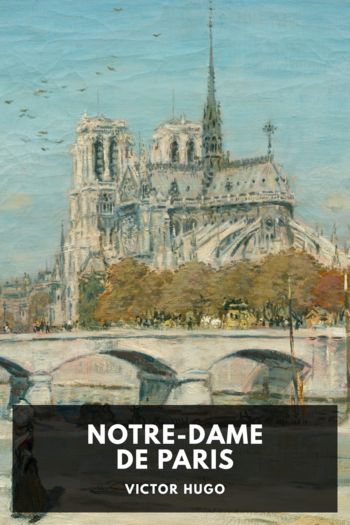Notre-Dame de Paris Victor Hugo (mobile ebook reader .txt) 📖

- Author: Victor Hugo
Book online «Notre-Dame de Paris Victor Hugo (mobile ebook reader .txt) 📖». Author Victor Hugo
Nevertheless, he was a fine man; he led a joyous cardinal’s life, liked to enliven himself with the royal vintage of Challuau, did not hate Richarde la Garmoise and Thomasse la Saillarde, bestowed alms on pretty girls rather than on old women—and for all these reasons was very agreeable to the populace of Paris. He never went about otherwise than surrounded by a small court of bishops and abbés of high lineage, gallant, jovial, and given to carousing on occasion; and more than once the good and devout women of Saint Germain d’ Auxerre, when passing at night beneath the brightly illuminated windows of Bourbon, had been scandalized to hear the same voices which had intoned vespers for them during the day carolling, to the clinking of glasses, the bacchic proverb of Benedict XII, that pope who had added a third crown to the Tiara—Bibamus papaliter.
It was this justly acquired popularity, no doubt, which preserved him on his entrance from any bad reception at the hands of the mob, which had been so displeased but a moment before, and very little disposed to respect a cardinal on the very day when it was to elect a pope. But the Parisians cherish little rancor; and then, having forced the beginning of the play by their authority, the good bourgeois had got the upper hand of the cardinal, and this triumph was sufficient for them. Moreover, the Cardinal de Bourbon was a handsome man—he wore a fine scarlet robe, which he carried off very well—that is to say, he had all the women on his side, and, consequently, the best half of the audience. Assuredly, it would be injustice and bad taste to hoot a cardinal for having come late to the spectacle, when he is a handsome man, and when he wears his scarlet robe well.
He entered, then, bowed to those present with the hereditary smile of the great for the people, and directed his course slowly towards his scarlet velvet armchair, with the air of thinking of something quite different. His cortège—what we should nowadays call his staff—of bishops and abbés invaded the estrade in his train, not without causing redoubled tumult and curiosity among the audience. Each man vied with his neighbor in pointing them out and naming them, in seeing who should recognize at least one of them: this one, the Bishop of Marseilles (Alaudet, if my memory serves me right);—this one, the primicier of Saint-Denis;—this one, Robert de Lespinasse, Abbé of Saint-Germain des Prés, that libertine brother of a mistress of Louis XI; all with many errors and absurdities. As for the scholars, they swore. This was their day, their feast of fools, their saturnalia, the annual orgy of the corporation of law clerks and of the school. There was no turpitude which was not sacred on that day. And then there were gay gossips in the crowd—Simone Quatrelivres, Agnès la Gadine, and Rabine Piédebou. Was it not the least that one could do to swear at one’s ease and revile the name of God a little, on so fine a day, in such good company as dignitaries of the church and loose women? So they did not abstain; and, in the midst of the uproar, there was a frightful concert of blasphemies and enormities of all the unbridled tongues, the tongues of clerks and students restrained during the rest of the year, by the fear of the hot iron of Saint Louis. Poor Saint Louis! how they set him at defiance in his own court of law! Each one of them selected from the newcomers on the platform, a black, gray, white, or violet cassock as his target. Joannes Frollo de Molendin, in his quality of brother to an archdeacon, boldly attacked the scarlet; he sang in deafening tones, with his impudent eyes fastened on the cardinal, “Cappa repleta mero!”
All these details which we here lay bare for the edification of the reader, were so covered by the general uproar, that they were lost in it before reaching the reserved platforms; moreover, they would have moved the cardinal but little, so much a part of the customs were the liberties of that day. Moreover, he had another cause for solicitude, and his mien as wholly preoccupied with it, which entered the estrade the same time as himself; this was the embassy from Flanders.
Not that he was a profound politician, nor was he borrowing trouble about the possible consequences of the marriage of his cousin Marguerite de Bourgoyne to his cousin Charles, Dauphin de Vienne; nor as to how long the good understanding which had been patched up between the Duke of Austria and the King of France would last; nor how the King of England would take this disdain of his daughter. All that troubled him but little; and he gave a warm reception every evening to the wine of the royal vintage of





Comments (0)